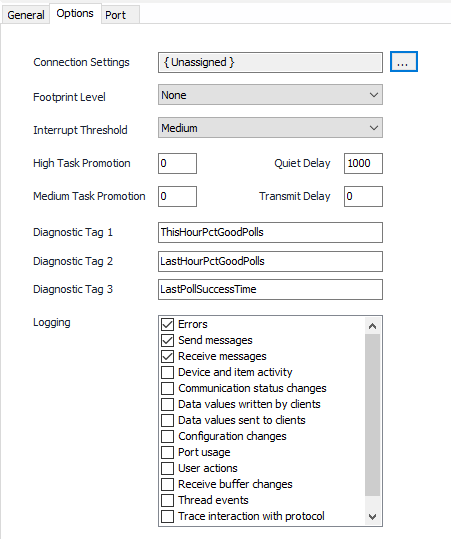| Expand | ||||
|---|---|---|---|---|
| ||||
|
Overview
The following attributes are common to all types of ports used in ACM.
...
| Info |
|---|
See the General Object Configuration |
...
| Info | ||
|---|---|---|
| ||
The common port attribute Enable Port is used here. |
guide for assistance configuring the General tab. |
Options Tab
Connections Setting
...
- Errors. (Default = Selected) Any errors occurring with communications or with unexpected results.
- Send messages. (Default = Selected) Every message sent to a device to request data will be logged.
- Receive messages. (Default = Selected) Every message sent to a port to provide data will be logged.
- Device and item activity. When items or devices are removed, added, activated or deactivated, an appropriate log is generated.
- Communication status changes. A message will be logged whenever communication status changes from bad to good or vice-versa.
- Data values written by clients. When data is written to an item, it will be logged in logical units.
- Data values sent to clients. When data is received from the device, it will be logged in logical units.
- Configuration changes. A message will be logged when any change to the current configuration is made.
- Port usage. A message will be logged when a socket or serial port opens and closes.
- User actions. Logs protocol transactions and requests generated by user commands.
- Receive buffer changes. Logs each change to a port's data buffer due to data received from the port.
- Thread events. Logs polling thread state events such as open, transmit, user done, quiet and close.
- Trace interaction with protocol. Logs notifications between protocol and communication modules.
- Suppress write entries. Removes write transaction related messages from being logged.
